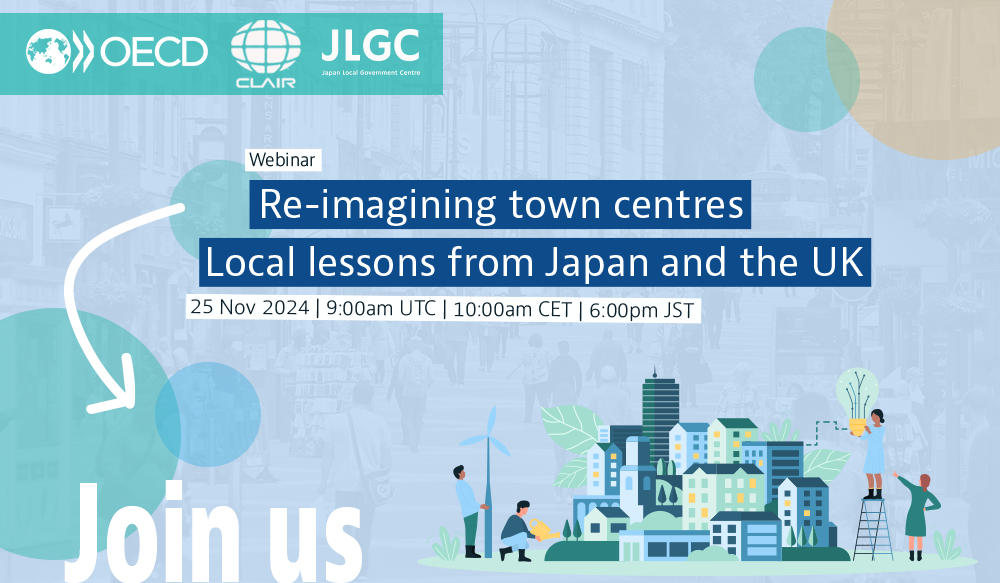Projects and Activities
JLGC Seminar

Town centres and local commercial districts are both economic and social hubs for local communities. They provide residents with local access to services and goods, are important sources of jobs and turnover, serve as community gathering points and foster local pride and identity. Despite their historic role as the “heart” of many communities, they are under increasing pressures, such as growing competition from e-commerce, declining foot traffic, and rising rent and energy costs.
The webinar heard how local communities in Japan and the UK have come up with innovative solutions to revitalise their high streets and town centres in light of these challenges and where there might be ground for mutual learning.
Opening:
• Akira MATSUTANI, Director General, Japan Local Government Centre, CLAIR UK
• Anna RUBIN, Manager of the Local Development Forum, Local Employment and Economic Development (LEED) Programme, Centre for Entrepreneurship, SMEs, Regions and Cities, OECD
Moderator:
• Prof. Cathy PARKER MBE, Chair of the Institute of Place Management, Manchester Metropolitan University, United Kingdom
Panel discussion:
• Kosuke TSUYUKI, Senior Staff, Urban Planning Department, Urban Development Policy Division, Numazu City, Japan
• Takao NOZAWA, Section Manager, Industry Promotion Division, Commerce and Industry Promotion Section, Tatsuno Town & Kota AKAHANE, Representative Director, MARU to Edit, inc., Japan
• Daniel HARPER, Head of Economic Development at Barnsley Council, England, United Kingdom
• Alasdair MORRISON, Head of Economy and Development at Renfrewshire Council, Scotland, United Kingdom
About the event
This webinar was organised in partnership between the OECD Local Development Forum and the Japan Local Government Centre, London.
The OECD Local Development Forum is a community of thousands of individuals worldwide, united by their shared commitment to making their communities more resilient, inclusive and sustainable. It brings together representatives of regional and national governments, employment and training agencies, economic and community development agencies, chambers of commerce, public employment services and social innovators from around the world. Through its events and online resources, the Forum serves as a venue for peer learning, disseminating local innovations and best practices at the global level, and bringing the OECD’s work beyond ministries to local communities.
The Japan Local Government Centre, London (JLGC) is an overseas office of Japan’s Council of Local Authorities for International Relations (CLAIR). CLAIR is a government-affiliated foundation that supports the internationalisation of local authorities in Japan by providing training opportunities, fostering people-to-people exchange with the Japan Exchange and Teaching (JET) Programme and other initiatives, supporting multiculturalism, and conducting research on their behalf. As the London Office of CLAIR, JLGC has responsibility for the following countries: Austria, Denmark, Finland, Germany, Ireland, Netherlands, Norway, Sweden and the United Kingdom.
Disclaimer: the above video of the event is solely for the purposes of viewing on this page and is not intended for wider distribution, all rights reserved
Previous JLGC Seminars have covered various topics including transport, renewable energy and local growth. A full list of themes with the accompanying reports from previous seminars can be found below.

